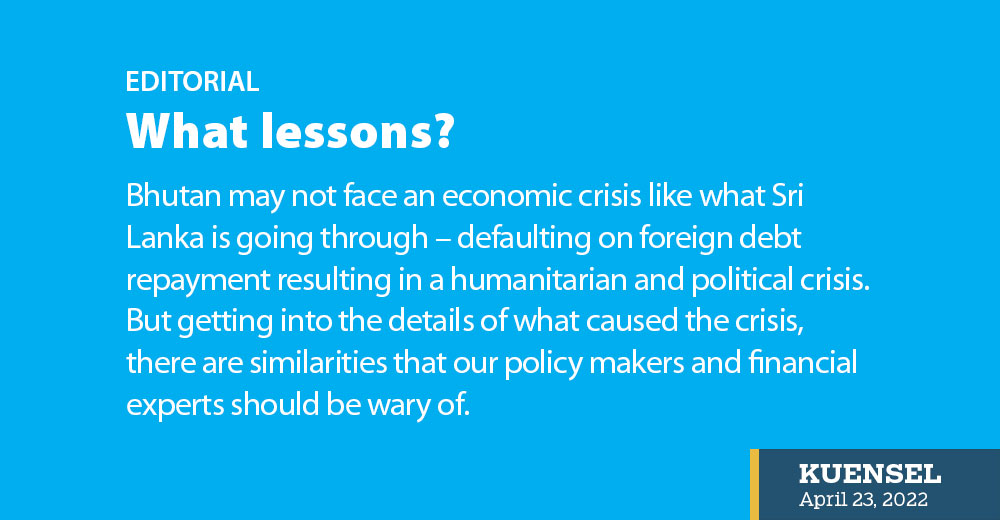Bhutan may not face an economic crisis like what Sri Lanka is going through – defaulting on foreign debt repayment resulting in a humanitarian and political crisis. But getting into the details of what caused the crisis, there are similarities that our policy makers and financial experts should be wary of.
The government is claiming to be exercising the “highest prudence” in managing foreign currency reserves. If dependence on import, uncontrolled import of luxury goods, high inflation rate, depreciating currency against the dollar and limited avenues to earn hard currency are symptoms of a crisis, we better be prepared.
As economists analyse why our South Asian friend became broke, they are finding loopholes in policies. The island nation had spent more than they had earned, cut taxes to appease voters, lost income in hard currencies from the pandemic, as tourism and remittance saw a free fall. Together with the rising debt and trade and budget deficits, it became, like what experts say, the perfect recipe for a disaster.
We are far better off and may not head down the same road as of now. Our debts, especially hydropower debts, are “self-liquidating,” we have not defaulted on debt servicing and our borrowings are favourable as we borrow from the International Monetary Fund, World Bank and the Asian Development Bank. We have grace periods and the low interest rates on loans for not resorting to borrowings from agencies or countries.
Yet, we should get out of our comfort zone and not let the crisis we are witnessing go into waste. The grounds are the same. The reserves (CC and INR combined) declined by 12 percent, from USD 1.6382 billion (B) in November to USD 1.4372B in December last year. The source of the dollar, tourism and the hotel industry is yet to pick up even with relaxations. Inflation is at an all-time high and our debt to GDP increased from 21 to 134 percent attributed to the higher borrowing from both external and domestic borrowing to finance requirements for Covid-19.
The government is making the people responsible for protecting our foreign currency reserves. This is easier said than done. With the private seeing a window of recovery from the pandemic, they will not heed to the call. Reserves can only be managed through policies.
When the economy was at its lowest growth level and people depended on kidus and fiscal and monetary measures, Bhutan imported 6,696 vehicles in one year- from March 2021 to March 2022. Import of vehicles drain reserves, INR or the dollar. In a pandemic year, we have replaced old Toyota Prados with brand new Toyota Fortuners for the 20 dzongdags. Those with money and doubly benefited from the fiscal and monetary measures are upgrading their cars while posing losses to the banks through increased savings. Banks have excess liquidity, yet there are many without access to finance to start a livelihood. The state’s trading corporation declared a 25 percent dividend in a pandemic year. We can surmise that a huge portion of the revenue came from the new acquisition of luxury four-wheel drive SUVs for the government officials and head of agencies. The trading company will have to make money. It is not their fault.
If deep tax cuts made Sri Lanka run out of money, our domestic revenue is on the decline because of populist taxation policies. Increasing the personal income tax slab, slashing business income tax, customs and excise duty on imports from third countries has resulted in decreased domestic revenue.
The proposed Goods and Service Tax, which is expected to recoup billions in taxes, seems to have hit a wall. There is a big problem judging by how officials are trying hard to hide information. The Bhutan Integrated Tax System (BITS) being developed by the Thimphu TechPark is delayed or put on hold. Officials are more worried about losing jobs than explain what went wrong or what is being done.


